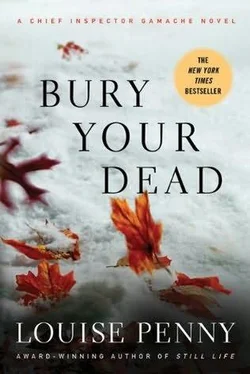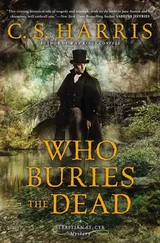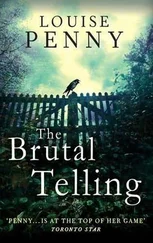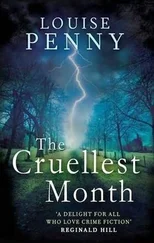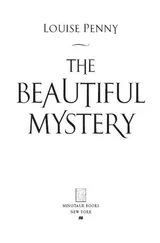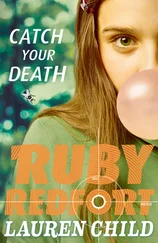Louise Penny - Bury Your Dead
Здесь есть возможность читать онлайн «Louise Penny - Bury Your Dead» весь текст электронной книги совершенно бесплатно (целиком полную версию без сокращений). В некоторых случаях можно слушать аудио, скачать через торрент в формате fb2 и присутствует краткое содержание. Жанр: Старинная литература. Описание произведения, (предисловие) а так же отзывы посетителей доступны на портале библиотеки ЛибКат.
- Название:Bury Your Dead
- Автор:
- Жанр:
- Год:неизвестен
- ISBN:нет данных
- Рейтинг книги:4 / 5. Голосов: 1
-
Избранное:Добавить в избранное
- Отзывы:
-
Ваша оценка:
- 80
- 1
- 2
- 3
- 4
- 5
Bury Your Dead: краткое содержание, описание и аннотация
Предлагаем к чтению аннотацию, описание, краткое содержание или предисловие (зависит от того, что написал сам автор книги «Bury Your Dead»). Если вы не нашли необходимую информацию о книге — напишите в комментариях, мы постараемся отыскать её.
Bury Your Dead — читать онлайн бесплатно полную книгу (весь текст) целиком
Ниже представлен текст книги, разбитый по страницам. Система сохранения места последней прочитанной страницы, позволяет с удобством читать онлайн бесплатно книгу «Bury Your Dead», без необходимости каждый раз заново искать на чём Вы остановились. Поставьте закладку, и сможете в любой момент перейти на страницу, на которой закончили чтение.
Интервал:
Закладка:
“Of course. Poor one.”
“I need your help,” said Beauvoir. “About the murder of the Hermit.”
TWENTY

It took Chief Inspector Gamache a moment to tear himself away from the 1860s Québec of Charles Chiniquy’s journals to the quaint village of Three Pines today.
And yet, it wasn’t that much of a leap. He suspected Three Pines probably hadn’t changed all that much in the last 150 years. Had Father Chiniquy chosen to visit the tiny hamlet he’d have seen the same old stone houses, the clapboard homes with dormers and smoking chimneys. He’d have walked across the village green to the shops made of faded rose brick, pausing perhaps to admire the trinity of trees at the very center of the community.
Only the people had changed in Three Pines in the past 150 years, with the possible exception of Ruth Zardo. Gamache could only imagine how Ruth would have greeted Father Chiniquy. He smiled at the thought of the drunken mad poet meeting the sober mad minister.
Well, take this then. Ruth had written. Have some more body.
Drink and eat.
You’ll just make yourself sick. Sicker.
You won’t be cured.
Would Chiniquy have cured her? Of what? Her drinking, her poetry? Her wounds? Her words?
“How can I help?” he asked Beauvoir, picturing his second in command sitting in the bistro in front of the fire with a micro-brewery beer and a bowl of salty chips.
“If Olivier didn’t kill the Hermit it comes down to five other suspects,” said Beauvoir. “Havoc Parra and his father Roar. Vincent Gilbert and his son Marc or Old Mundin.”
“Go on.” Gamache looked out the window of the Café Krieghoff to the cars crawling along the snowy evening street and the cheerful holiday lights still up. The capital had never looked prettier.
“There are two questions. Who had the opportunity and who had the motive? From what I can see, Roar, Havoc and Marc had the opportunity. Roar was cutting the trails that led right to the Hermit. The cabin was on Marc’s land and he could have walked those trails at any time and found it.”
“C’est vrai,” said the Chief, nodding as though Beauvoir could see him.
“Havoc worked late every Saturday and could have followed Olivier to the cabin.”
Gamache paused, remembering the case, remembering the night the Hermit had been killed. “But it wasn’t just Havoc in the bistro, Old Mundin also came in every Saturday night around closing time to get furniture to repair. He was there the night of the murder.”
“That’s true,” agreed Beauvoir. “Though he mostly went straight home before the bistro was locked up. But, yes, he’s a possibility.”
“So that’s Roar and Havoc Parra, Old Mundin and Marc Gilbert. All could have found the cabin and killed the Hermit. So why is Vincent Gilbert still a suspect? As you say, he doesn’t seem to have had the opportunity to find the cabin.”
Beauvoir paused. “It just seems too pat. His son buys a derelict old home no one wanted. They move here, then the Hermit is murdered and Marc’s estranged father shows up at almost exactly the same moment.”
“But you have no proof,” said Gamache, pushing slightly, “beyond a feeling.”
He could sense his second in command bristle. Jean-Guy Beauvoir had no truck with “feelings,” with “intuition.” Gamache, on the other hand, did.
“But you might be right,” said the Chief. “And what about motive?”
“That’s more difficult. We know why Olivier might have wanted the Hermit dead, but why would anyone else? If the motive was robbery the killer made a pretty poor job of it. From what we can make out, nothing was stolen.”
“What other motives could there be?” asked Gamache.
“Revenge. The Hermit did something terrible and the murderer found him and killed him for it. Might have been hunting him for years. That would also explain why the Hermit was a hermit. He was hiding. Those treasures had to come from somewhere. He almost certainly stole them himself.”
“Then why didn’t the murderer take them after he’d killed the Hermit? Why leave everything there?”
Gamache saw again the home buried in the wilderness. From the outside it seemed just a rustic log cabin, with window boxes of flowers and herbs, a vegetable garden, a fresh stream behind the home. But inside? Signed first editions, ancient pottery, tapestries, a panel from the famous Amber Room, leaded crystal and gold and silver candlesticks. And the violin.
And he saw young Agent Morin standing in the cabin, so awkward, like a wooden puppet, all gangly arms and legs. But as soon as he’d played that priceless violin his body had changed.
The haunting first notes of “Colm Quigley” returned to Gamache.
“There’s another possibility,” said Beauvoir. “The murder wasn’t about the treasure but something else the Hermit had done.”
“Your theory then is that the treasure distracted us. Distracted me.”
“No one who walked into that cabin believed the motive was anything other than the treasure. It seemed so obvious.”
But Gamache knew Beauvoir was being uncharacteristically tactful. He, Gamache, had been in charge of the investigation. He’d assigned the agents and investigators and he’d followed his own instincts, often in the face of strong protests on the part of Inspector Beauvoir who’d insisted all along both the murderer and the motive were in Three Pines.
Gamache now believed Beauvoir was right, and he’d been wrong. And perhaps had put an innocent man in prison.
“Okay, let’s suppose the treasure had nothing to do with the murder,” said the Chief Inspector. “Suppose the only thing of value the murderer wanted was the Hermit’s life and once taken he left.”
“So,” said Beauvoir, slinging his leg over the side of the easy chair and burrowing into the wing. He was hidden from view of the rest of the bistro, only his casual leg visible. No one could see him, but neither could he see anyone. “Take away the treasure but that still leaves us with other clues. The repetition of the word ‘Woo’ whittled into that chunk of red cedar, and woven into the web. It must mean something. And Charlotte, that name kept popping up, remember?”
Gamache did remember. It had sent him rushing across the continent to a mist-covered archipelago in northern British Columbia, on what now appeared to be a fool’s errand.
“There’s something about your list of suspects,” said Gamache after going over each one again in his head.
“Oui?”
“They’re all men.”
“Are you afraid the Equal Opportunity Bureau’s going to complain?” laughed Beauvoir.
“I just wonder if we should be considering some of the women,” said Gamache. “Women have patience. Some of the most vicious crimes I’ve seen have been committed by women. It’s more rare than men, but women are more likely to bide their time.”
“That’s funny, Clara was saying the same thing this afternoon.”
“How so?” Gamache leaned forward. Anything Clara Morrow had to say was, in the Chief’s opinion, worth listening to.
“She spent the morning with a bunch of women from the village. Apparently Old’s wife said something odd. She quoted some instruction manual that advised anti-terrorism squads to kill the women first.”
“The Mossad,” said Gamache. “I’ve read it.”
Beauvoir was silent. The Chief Inspector often surprised him. Sometimes it was with incomprehensible bits of Ruth’s poetry but mostly it was with things like this, with what he knew.
“So you know what it refers to,” said Beauvoir. “A woman’s capacity to kill.”
Читать дальшеИнтервал:
Закладка:
Похожие книги на «Bury Your Dead»
Представляем Вашему вниманию похожие книги на «Bury Your Dead» списком для выбора. Мы отобрали схожую по названию и смыслу литературу в надежде предоставить читателям больше вариантов отыскать новые, интересные, ещё непрочитанные произведения.
Обсуждение, отзывы о книге «Bury Your Dead» и просто собственные мнения читателей. Оставьте ваши комментарии, напишите, что Вы думаете о произведении, его смысле или главных героях. Укажите что конкретно понравилось, а что нет, и почему Вы так считаете.
